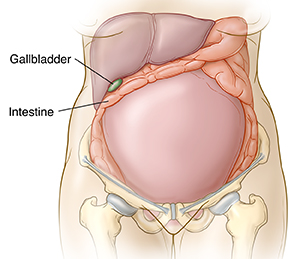Abdominal Pain in Pregnancy, Gallstones
You have pain in your upper belly (abdomen) that may be caused by gallstones. The gallbladder is an organ that stores fluid called bile. The gallbladder sends bile into the intestines to help you digest your food. A small amount of bile sometimes stays in the gallbladder. In time, this bile can harden, forming gallstones. If stones move into the tube (duct) that carries bile out of the gallbladder, they can cause pain or infection.

Gallstones are more likely to occur during pregnancy. This is because you have higher amounts of hormones at this time that affect the biliary system. Other things that make it more likely to have gallstones are family history and a diet that’s high in fatty foods.
One common symptom is pain and cramping in your belly, often after you eat. The pain is in the upper right part of your belly. These are other common symptoms of gallstones:
-
Nausea and vomiting
-
Loss of appetite
-
Itching without a rash
-
Jaundice
-
Pale-color stool
-
Dark urine
-
Fever
You and your healthcare provider will decide on the best treatment for you. Here’s what you can do to ease your discomfort in the meantime.
Home care
Medicines
Your healthcare provider may prescribe medicine to help ease pain. Follow your healthcare provider’s directions for taking these medicines.
General care
You can’t control your family history or your hormones. But you can make changes to your diet. Changing your diet won't fix your gallbladder, but it may help with the symptoms. Here are some general care guidelines:
-
Eat a diet high in fiber and low in fat. Don't eat greasy or fried foods.
-
Read food labels to be sure the foods you are choosing are low in fat.
-
Limit high-fat meats, dairy products, animal fats, and vegetable oils.
-
Keep all appointments with your healthcare provider. Your provider needs to watch your condition.
Surgery for gallstones is generally not done during pregnancy unless the gallstones are causing severe pain or you have an infection. Discuss your treatment choices with your provider. You might need:
-
Medicine to dissolve the stones.
-
A procedure called an ERCP to find the stones and remove them. The ERCP uses a thin tube with video and X-rays.
-
Surgery to remove the gallstones.
Even after treatment, gallstones can return.
Follow-up care
Follow up with your healthcare provider, or as advised.
Call 911
Call 911 if any of the following occur:
-
Severe lightheadedness, passing out, or fainting
-
Fast heart rate
-
Trouble breathing
-
Confusion or trouble waking up
When to get medical advice
Call your healthcare provider right away if any of the following occur:
-
Fever of 100.4°F (38°C) or higher, or as directed by your healthcare provider
-
Severe pain in the upper belly, shoulder, or back
-
Nausea or vomiting
-
Yellowing of the skin or eyes (jaundice)
-
Vaginal bleeding, fluid leaking from the vagina, or baby's lack of movement